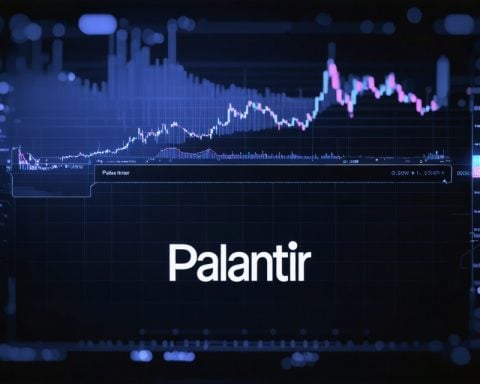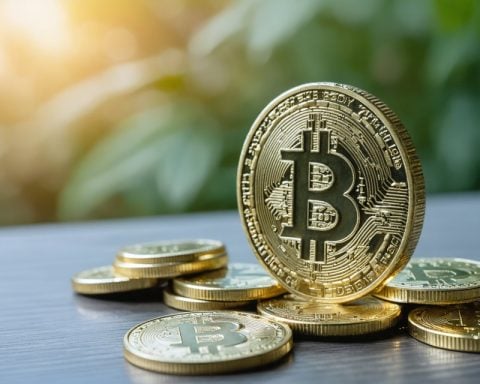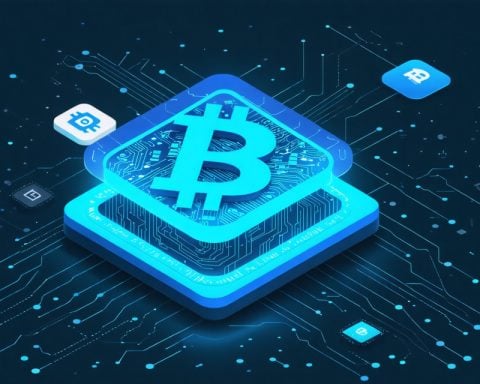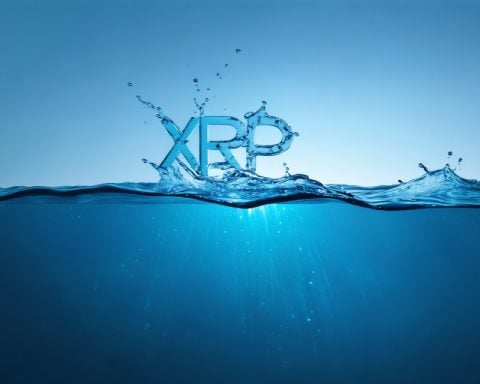- The SEC’s acknowledgment of XRP ETFs sparks speculation about XRP’s classification as a commodity or security in the crypto industry.
- Ripple Labs remains embroiled in a legal battle with the SEC, with the lawsuit influencing XRP’s regulatory identity and market perception.
- XRP experienced a significant trading surge, with prices rising by 22% to £2.84, creating uncertainty about its future price movements.
- A favourable ruling for XRP could set a regulatory precedent impacting major platforms like Binance and Coinbase.
- Uncertainties persist as to whether the SEC will continue its legal pursuit or appeal against developments regarding XRP.
- The evolving situation keeps investors and industry observers on edge, as XRP’s fate could significantly influence the broader crypto landscape.
A storm brews in the world of digital currency as the SEC’s nod to XRP ETFs ignites fervent speculation over the asset’s true identity. Could XRP be aligning with the houses of Bitcoin and Ethereum as a commodity, or is it doomed to remain ensnared in regulatory purgatory?
The SEC’s recent acknowledgment has sent the Ripple community into a tizzy, with trading floors buzzing and investors poring over the implications. This agency’s action nudges XRP into a new light, painting it as a commodity shrouded in securities fabric. Yet, the absence of a crystal-clear classification leaves ambiguity hanging over the crypto markets.
Eclipsed by its lengthy legal skirmish, Ripple Labs trudges through its intricate dance with the SEC, vying for clarity while grappling with an ongoing lawsuit. This pivotal case takes centre stage, spotlighting if XRP steps into stardom as a non-security in secondary exchanges—or slips back on its direct sale violations.
A recent surge in XRP trading, marked by a dizzying 22% price rise to £2.84, teeters on the edge of further ascents or perilous plummets. With SEC’s ETF approval acting as a double-edged sword, XRP’s trajectory could either breach the iconic £3 mark or stagnate under selling pressures.
Beyond Ripple’s drama, the SEC’s actions could tilt the scales for major platforms like Binance and Coinbase. A ruling in favour of XRP as a commodity could set a precedent, revolutionising regulatory approaches for digital assets.
Still, the developments stoke questions: Will the SEC relent in its pursuit, or tighten its grip with an appeal? The answers lie ahead, as investors and industry onlookers await XRP’s pivotal moment—a twist or turn that could reshape crypto’s future. Until then, the market brims with anticipation, each tick of the clock echoing with unresolved expectancy.
Will XRP Revolutionise the Crypto Market? What the SEC’s Decision Means for Digital Assets
How XRP’s Potential Commodity Status Could Transform the Crypto Industry
How-To Steps & Life Hacks: Protecting Investments in Volatile Crypto Markets
Investors dealing with XRP or any crypto asset can adopt strategies to protect their investments amidst fluctuating market conditions:
1. Diversify Your Portfolio: Don’t put all your eggs in one basket. Spread investments across various assets to mitigate risks.
2. Stay Informed: Keep up with the latest news regarding regulatory changes and market trends affecting XRP.
3. Use Stops and Limits: Utilise stop-loss orders to sell assets when they fall to a certain price, and limit orders to buy or sell assets at specified target prices.
4. Secure Your Holdings: Use hardware wallets or secure exchanges with a strong track record to store your digital assets safely.
5. Regularly Review Your Strategy: Analyse your investment strategy routinely and adapt to changing market conditions.
Real-World Use Cases of XRP
Ripple’s XRP is renowned for its capability to facilitate cross-border transactions swiftly and at a lower cost than traditional systems. Financial institutions use XRP for settling international transactions, drastically reducing the time and fees involved compared to conventional banking systems.
Market Forecasts & Industry Trends
According to market analysts, if XRP is granted commodity status, we could witness a more significant influx of institutional investors who might have previously been wary due to regulatory uncertainties. Historical trends show that regulatory clarity often leads to increased adoption and a surge in asset valuation.
Reviews & Comparisons: How XRP Stands Against Bitcoin and Ethereum
– Speed and Cost: XRP boasts faster and cheaper transactions compared to Bitcoin and Ethereum, making it more appealing for everyday transactions.
– Decentralisation: Unlike Bitcoin’s fully decentralised nature, critique often centres around Ripple’s governance influence over XRP, which some see as a limitation compared to Ethereum’s robust decentralised network.
Controversies & Limitations
Despite its advantages, XRP has been embroiled in legal battles with the SEC, leading to investor caution. The primary controversy centres around whether XRP should be classified as a security. Ripple’s legal tussles have created an air of uncertainty around its long-term viability as an investment.
Features, Specs & Pricing
– Transaction Speed: XRP transactions typically settle in 4 seconds.
– Transaction Cost: Extremely low, usually a fraction of a cent, enhancing its utility for microtransactions.
– Market Capitalisation: As of recent trading trends, the market cap fluctuates based on market conditions and regulatory developments.
Security & Sustainability
XRP’s consensus protocol requires minimal energy compared to the Proof-of-Work (PoW) mechanisms used by Bitcoin, making it more environmentally sustainable and efficient in resource consumption.
Insights & Predictions
Experts predict that XRP’s acknowledgment as a commodity could set a precedent, encouraging similar assets to seek regulatory clarity. This status could open the floodgates for regulatory reform in the blockchain space, fostering innovation and broader adoption.
Tutorials & Compatibility
XRP is compatible with various digital wallets and can be traded on numerous cryptocurrency exchanges globally. Users should ensure compatibility with platforms that offer robust security features.
Pros & Cons Overview
Pros:
– Swift and Cost-Effective Transactions
– Energy Efficient
– Growing Adoption in Financial Services
Cons:
– Regulatory Uncertainty
– Centralisation Concerns
– Legal Battles with SEC
Recommendations for Investors
– Conduct Thorough Research: Analyse the market, regulatory changes, and XRP’s role in your investment strategy.
– Risk Management: Be prepared for volatility, use stop-loss orders, and only invest what you’re willing to lose.
– Stay Updated: Follow credible sources for updates and insights. Consider joining crypto communities for real-time discussions.
For more information on digital assets and trading, visit Ripple.
By leveraging these insights and strategies, investors can better navigate the evolving landscape of XRP and digital currencies, seizing opportunities while mitigating risks.















